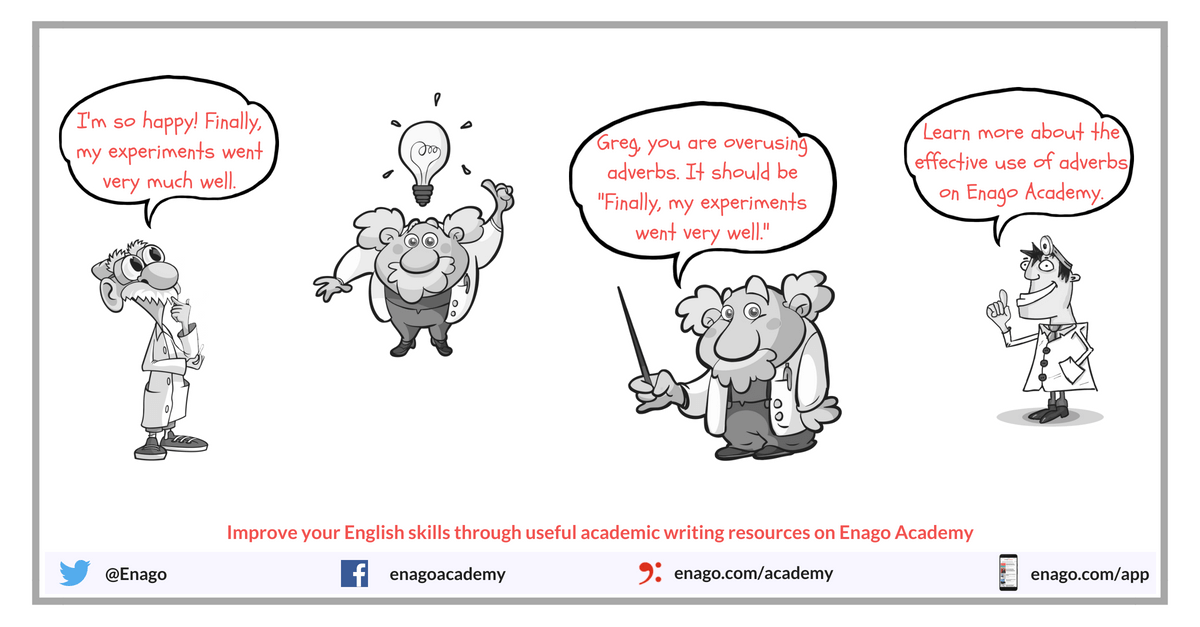How to Use Adverbs Effectively in Journal Manuscripts

Adverbs, the lesser known offspring of adjectives and verbs, are words that modify the original meaning of their parents – the adjective and the verb. Adverbs in scientific writing can alter the way an action can be done, such as “thoroughly” or “briskly”. To do something “very quickly” has an entirely different meaning to doing something “quickly enough”. This is what makes adverbs so important. They tell us more about what is going on. While we will shed more light on how to use adverbs effectively in journal manuscripts, we recommend you to use Trinka, a robust AI-powered tool that helps with effective academic writing. Trinka suggests the best adverb depending on the context and makes your writing impressive. It also makes essential language enhancements that match the journal publication standards.
How to Use Adverbs Correctly in Research Papers?
In many research papers, adverbs can be used effectively to demonstrate a point. You could refer to a scientist who “regularly” expresses the same view or bias by using an adverb to show the extent of their credibility as a source. You could also write that another source cited in your paper “expertly” stated a case, or that they “eloquently” made their point. These would all add plausibility to the reason you chose them as your research paper’s sources, making your paper have a stronger argument overall. Adverbs can be incredibly useful in bringing across the stronger meaning of a sentence, and can be extremely persuasive. “Incredibly” and “extremely” are just two examples of this.

Where Do We Use Adverbs in Different Sentences?
In different sentences, adverbs create different meaning. They can heighten or lower the extent of any action. For example
It was a poorly orchestrated research.
The book has some or exceptionally well written pieces.
They can describe the manner of an action, such as a “hastily” typed essay. Adverbs can even tell you when it happened, “early” in the morning. They can intensify, and “really” add weight and potency to a sentence that would “simply” be lacking without a “handy” adverb.
When and How (Not) to Use Adverbs?
Now you know what adverbs are and how to use them in your research paper. Sadly, the value of adverbs relies on their being used infrequently. You cannot constantly intensify words in your research paper. For example,
Our sources are “really” good because they “truly” state their “rigorously” informed opinion.
There are so many adverbs used in the sentence that it has lost meaning. Certain verbs are there which replace these adverbs. For instance, rather than saying you are “seriously” interested in the research paper’s topic, you could say you were “engrossed” in it. This verb conflates the meaning of two words, the adverb and the adjective, into one.
Worse than overusing adverbs is using an adverb in a grammatically incorrect sentence. It can take away the meaning and lower the standard of your paper overall. For this reason, keep in mind the rules of grammar.
- If you were to say the experiment went “very much well”, you are adding a determiner after an adverb. This is unnecessary, so just go for “very well” instead.
- If you wrote that your professor “aggressively” took the temperature, you would also be using the adverb incorrectly. The adverb goes after the action in the structure of this sentence, so you would write that your professor took the temperature “aggressively”, intensifying their action further.
Adverbs to Avoid in Academic Writing
Intensive adverbs such as very, truly, really, actually, and extremely are avoided in academic writing. Intensive adverbs often weaken instead of intensifying the words. A “really important conference” doesn’t sound professional or consequential than an “important” one.
The proper use of adverbs in grammar is an important aspect of academic writing. For an overview on other aspects of academic writing such as punctuation, you can check importance of punctuation in research paper (part1) and (part 2).
How often do you use adverbs in your research paper? Please let us know your thoughts in the comments section below.




